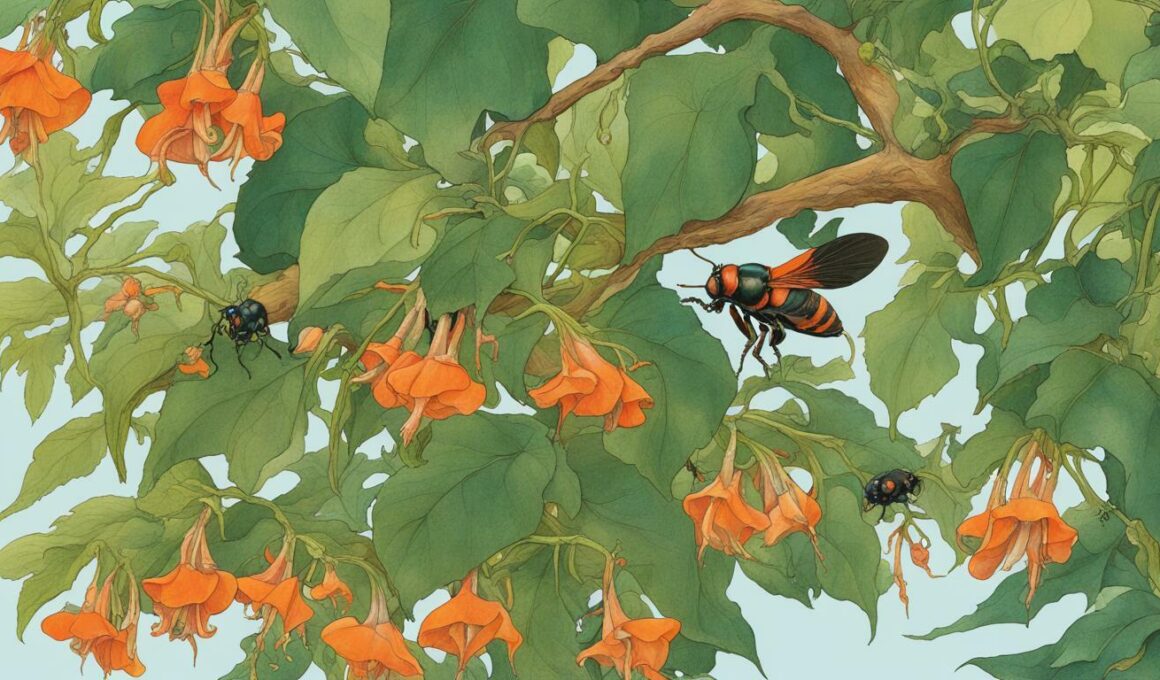If you have a beautiful trumpet vine in your garden, you may be wondering if Japanese beetles pose a threat to this stunning plant. The answer is yes, unfortunately. Japanese beetles are infamous for their voracious appetite, and they will happily feast on the foliage of your trumpet vine if they get the chance. In this section, we will explore the impact these pests can have on your trumpet vine and provide guidance on how to protect it from beetle damage.
Post Summary:- Japanese beetles can eat the foliage of your trumpet vine.
- Protecting your vine from beetle damage is crucial to ensure its health and beauty.
- Understanding the beetle’s life cycle and employing effective control methods can help prevent infestations.
Understanding the Japanese Beetle Life Cycle
If you want to effectively control Japanese beetles eating your trumpet vine, you must first understand their life cycle. The Japanese beetle life cycle consists of four stages: egg, larva, pupa, and adult.
Japanese beetles lay their eggs in the soil during early summer. These eggs hatch, and the larvae emerge to feed on the roots of grasses and other garden plants. They will continue to feed and grow throughout the summer months until they enter the pupa stage. During the pupa stage, the beetle is transforming into its adult form. Finally, the adult beetles emerge from the ground in late June or early July.
Adult Beetle Feeding Habits
The adult Japanese beetles are notorious for their feeding habits, which can cause significant damage to your trumpet vine. They typically feed during the day and prefer plants with soft foliage, like your trumpet vine. They eat the leaves and flowers, leaving only the veins behind.
It’s essential to know that these beetles release pheromones that attract their kind to your yard. Therefore, if you spot Japanese beetles on your trumpet vine or any other plant in your garden, you can expect more of them to come.
Effective Control Methods
To prevent Japanese beetles from damaging your trumpet vine, you can use various control methods. One of the most effective ways to control Japanese beetles is by physically removing them by hand. You can use a container of soapy water to drop them in as you remove them. Other control methods include using chemical insecticides or natural remedies. Neem oil, milky spores disease, and garlic sprays are some examples of natural remedies that can help control Japanese beetles.
Another way to prevent Japanese beetles from eating your trumpet vine is by planting other plants that they don’t find attractive. Plants like marigolds, larkspur, and boxwood repel Japanese beetles.
However, using chemical insecticides or natural remedies should not be your only course of action. You can also encourage natural predators, such as birds or wasps, to help control the beetle population in your garden.
In summary, understanding the Japanese beetle life cycle can help you take proactive measures to control these pests effectively. By removing beetles by hand, using natural remedies or insecticides, and encouraging natural predators, you can prevent Japanese beetles from eating your trumpet vine and other garden plants.
Controlling Japanese Beetles and Protecting Your Trumpet Vine
If you suspect Japanese beetle damage on your trumpet vine, taking quick action can help prevent the infestation from spreading. Here are some methods to manage these pests and protect your beautiful vine.
Chemical Control
Using chemical insecticides can be an effective method of controlling Japanese beetles. However, be sure to follow the manufacturer’s instructions carefully, as these chemicals can be harmful to both the environment and beneficial insects. Apply the insecticide early in the morning or late in the evening when the beetles are less active.
Natural Remedies
If you prefer a more natural approach, there are several options to consider. One is to handpick the beetles off your vine, which can be time-consuming but effective. Another is to apply neem oil, a natural pesticide derived from the neem tree, which can repel beetles. Additionally, some plants such as chrysanthemums contain pyrethrins, which can also be effective in repelling Japanese beetles.
Companion Planting
Planting companion plants that Japanese beetles dislike can also help deter them. Examples include catnip, chives, garlic, and alliums. On the other hand, some plants such as roses and grapevines are more attractive to Japanese beetles, so it’s best to avoid planting them near your trumpet vine.
Other Cultural Practices
In addition to the above methods, other cultural practices can also help protect your trumpet vine from Japanese beetles. For example, keeping the soil moist, but not overwatering, can help prevent stress on the vines that can attract pests. Additionally, clearing away any debris or weeds around the vine can discourage the beetles from laying eggs.
By taking proactive measures and implementing these methods, you can help control Japanese beetle infestations and protect your beautiful trumpet vine. Remember to monitor your vine regularly, and take quick action if you suspect any damage.
Can Japanese Beetles Damage Honeysuckle Plants as well?
Can Japanese Beetles damage honeysuckle plants as well? The issue of honeysuckle vs trumpet vine explained highlights the vulnerability of honeysuckle plants to these destructive insects. Japanese Beetles feed voraciously on the leaves, buds, and flowers of honeysuckle plants, causing severe damage. It is important for gardeners to be vigilant and take preventive measures to protect their honeysuckle plants from infestation.
Creating a Beetle-Resistant Environment for Your Trumpet Vine
Along with directly controlling Japanese beetles, creating a beetle-resistant environment for your trumpet vine is an effective way to minimize their impact on the plant’s health and beauty.
One method is companion planting. Choosing plants that repel Japanese beetles, such as garlic and chives, and planting them near your trumpet vine can act as a natural deterrent. Additionally, marigolds and petunias are known to attract ladybugs, which are natural predators of Japanese beetles.
Proper irrigation is also essential in discouraging beetle infestations. Overwatering can damage the roots of your trumpet vine, making it more susceptible to beetle damage. Therefore, it’s crucial to water your vine correctly and avoid creating standing water around the plant.
Another cultural practice that can reduce the impact of Japanese beetles is pruning. By removing any dead or damaged foliage, you can prevent the beetles from using those areas as breeding grounds and reduce their population over time.
| Tip: | Try to prune your trumpet vine in the spring to remove any winter damage and prepare it for the growing season ahead. |
|---|
Finally, ensure your trumpet vine is healthy and resilient against beetle attacks by providing adequate nutrients and sunlight. A strong, healthy plant is less likely to be severely impacted by Japanese beetles.
By creating a beetle-resistant environment for your trumpet vine, you can protect your plant from beetle damage, reduce the need for chemical interventions, and enjoy a beautiful, healthy vine.
Conclusion
Congratulations! You’ve learned how to protect your beautiful trumpet vine from Japanese beetle damage. By understanding the life cycle of these pests and implementing effective control methods, you can prevent infestations and promote the overall health of your vine.
Remember to regularly inspect your trumpet vine for signs of beetle activity and promptly take action if any are detected. By incorporating beetle-resistant practices, such as companion planting and proper irrigation, you can create a healthy environment for your vine.
With these tips and tricks, you can enjoy vibrant and healthy trumpet vines year after year without the threat of Japanese beetle damage. Happy gardening!
FAQ
Q: Do Japanese beetles eat trumpet vine?
A: Yes, Japanese beetles can eat trumpet vine foliage, which can lead to damage and reduced plant health.
Q: How can I protect my trumpet vine from Japanese beetle damage?
A: There are several methods you can use to protect your trumpet vine from Japanese beetles, including physical removal of beetles, applying insecticides, using natural remedies, and creating a beetle-resistant environment.
Q: What are some natural remedies for controlling Japanese beetles?
A: Some natural remedies for controlling Japanese beetles include companion planting with beetle-repellent plants, using traps and deterrents, handpicking beetles, applying neem oil or insecticidal soap, and promoting beneficial insects that prey on beetles.
Q: How do I create a beetle-resistant environment for my trumpet vine?
A: To create a beetle-resistant environment for your trumpet vine, you can practice companion planting with plants that repel beetles, ensure proper irrigation to avoid stress on the plant, provide adequate sunlight and airflow, and remove debris that may attract beetles.









